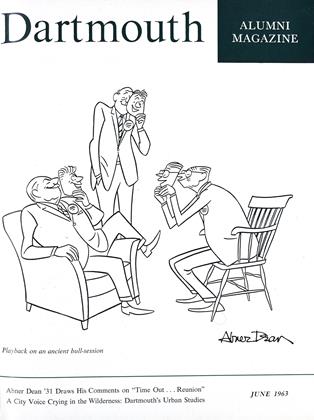By Thomas B. Curtis'32. New York: Duel!, Sloan & Pearce,1962. 126 pp. $1.95.
The proper role of the "loyal opposition" presents a perpetual strategic dilemma to the political party not controlling the White House: Should the party strike out with its own affirmative proposals or should its role be limited to criticism of the Administration's programs? No doubt the question is one of degree, but the theory of minorityparty activism has an articulate proponent in veteran Congressman Thomas B. Curtis of St. Louis. And no issue has engaged his considerable talents as consistently as the growing phenomenon of unemployment — recently characterized by President Kennedy as our most pressing domestic problem. In the summer of 1961, Curtis and forty-eight of his Republican House colleagues organized an "Operation Employment" task force which discussed the issue, gathered supporting monographs, and issued a report. The present volume is Curtis' synthesis of this group's work.
Two theories have been advanced by observers seeking to explain the persistence of large-scale unemployment in a seemingly healthy economy. The first view, often associated with the current Council of Economic Advisers, holds that the economy is essentially sluggish, plagued by a deficiency of aggregate demand. The second view (whose most publicized proponent has been Federal Reserve Director William McC. Martin) points to structural changes in the economy as the prime generators of unemployment.
This second theory forms the basis for Curtis' diagnosis. Structural unemployment is rooted in the propensity of a fast-moving technology to render obsolescent once-prospering industries and once-marketable skills. "... There is a dislocation between the plenitude of jobs that are available and the skills needed to fill them." Hence, Curtis stresses the creation of skills to fill jobs, rather than the "big-spending" approach of creating jobs to fit available skills. To this end Curtis calls for more adequate unemployment data, a national "clearinghouse" for job information, and federal sponsorship and encouragement of retraining programs - all underpinned by thoroughgoing tax revision.
Encouragement of labor mobility will not prove an easy task, in light of Adam Smith's observation that "men are of all baggage the most difficult to transport." Yet coherent public policy in this direction must be formulated and enacted. To this enterprise Curtis has added a persuasive voice, and we are indebted to him.
 View Full Issue
View Full Issue
More From This Issue
-
 Feature
FeatureAs the Century Turned
June 1963 By Edward Connery Lathem '51 -
 Feature
FeatureA CITY VOICE CRYING IN THE WILDERNESS
June 1963 By H. WENTWORTH ELDREDGE '31 -
 Feature
FeatureNine of Dartmouth's Distinguished Professors Retire on June 30
June 1963 -
 Feature
FeatureTIME OUT ... REUNION
June 1963 By Abnez Dean -
 Class Notes
Class Notes1931
June 1963 By WILLARD C. WOLFF, WILLIAM T. WENDELL -
 Books
BooksLew Stilwell: A Fine Teacher
June 1963 By JAMES L. MONTAGUE '28
ROGER H. DAVIDSON
Books
-
 Books
BooksShelflife
Nov/Dec 2006 -
 Books
BooksThe Magazine's Loss
DECEMBER 1963 By C.E.W. -
 Books
BooksConversation
September 1980 By Colette L. Gaudin -
 Books
BooksTHE BOOK OF THE WHITE MOUNTAINS
November, 1930 By N. L. Goodrich -
 Books
Books* DARTMO UTH OUTING CLUB HANDBOOK.
February 1933 By N. L. Goodrich -
 Books
BooksTHE DECLINE OF AMERICAN LIBERAL-
April 1956 By ROBERT E. RIEGEL


